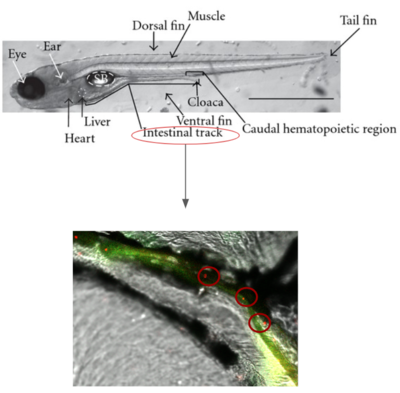Fundamental Biological Factors Underlying Human Performance: From Molecular Diagnostics and Detection to Behavior and Systems Biology: Difference between revisions
From Murray Wiki
Jump to navigationJump to search
No edit summary |
No edit summary |
||
| Line 2: | Line 2: | ||
In collaboration with researchers at MIT (Lauffenburger) and ERDC (Perkins, Vinas) we are using zebrafish as a model organism for studying gut microbiome-brain interactions, with a focus on how the chemistry of the gut microbiome affects organism behavior, including sleep patterns and stress. Zebrafish provide an outstanding platform due to their maturity as a model organism as well as their transparent state as an embryo, allowing imaging of gut microbes and other biological features. | In collaboration with researchers at MIT (Lauffenburger) and ERDC (Perkins, Vinas) we are using zebrafish as a model organism for studying gut microbiome-brain interactions, with a focus on how the chemistry of the gut microbiome affects organism behavior, including sleep patterns and stress. Zebrafish provide an outstanding platform due to their maturity as a model organism as well as their transparent state as an embryo, allowing imaging of gut microbes and other biological features. | ||
[[Image:arl19-zebrafish.png|right|400px]] | |||
{| cellpadding=0 cellspacing=0 width=80% | {| cellpadding=0 cellspacing=0 width=80% | ||
|- valign=top | |- valign=top | ||
| Line 17: | Line 18: | ||
=== Objectives === | === Objectives === | ||
Caltech's portion of the project focuses on two primary tasks: | Caltech's portion of the project focuses on two primary tasks: | ||
# The influence of gut microbiome on brain function: Diagnostics and logging of microbiotic environments in organisms. This effort will investigate how to diagnose and monitor disruption of the composition and function of the gut microbiota, which is an important pathophysiological factor in a variety of physiological disorders associated with animal and human microbiota. | # The influence of gut microbiome on brain function: Diagnostics and logging of microbiotic environments in organisms. This effort will investigate how to diagnose and monitor disruption of the composition and function of the gut microbiota, which is an important pathophysiological factor in a variety of physiological disorders associated with animal and human microbiota. | ||
Revision as of 23:13, 25 December 2018
In collaboration with researchers at MIT (Lauffenburger) and ERDC (Perkins, Vinas) we are using zebrafish as a model organism for studying gut microbiome-brain interactions, with a focus on how the chemistry of the gut microbiome affects organism behavior, including sleep patterns and stress. Zebrafish provide an outstanding platform due to their maturity as a model organism as well as their transparent state as an embryo, allowing imaging of gut microbes and other biological features.

|
Current participants: Additional participants: |
Collaborators: Past participants:
|
Objectives
Caltech's portion of the project focuses on two primary tasks:
- The influence of gut microbiome on brain function: Diagnostics and logging of microbiotic environments in organisms. This effort will investigate how to diagnose and monitor disruption of the composition and function of the gut microbiota, which is an important pathophysiological factor in a variety of physiological disorders associated with animal and human microbiota.
- The influence of gut microbiome/brain interactions on the systems biology of performance. This effort will investigate the molecular and cellular mechanisms underlying microbiota-brain interactions through which gut microbiomes can modulate host behaviors and neurophysiological processes.
References
- Analysis of Circuits for Dosage Control in Microbial Populations. Sophie J. Walton, Samuel E. Clamons, Richard M. Murray. Senior thesis.
|
|
|